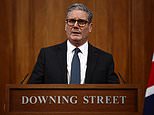
Tesco‘s boss said it was ‘lowering prices as quickly as possible’ as the UK’s battle against inflation continues to ease.
Britain’s biggest supermarket said it had recently cut prices on thousands of lines across its stores as ‘cost inflation headwinds ease’.
Tesco’s lower pricing has come as it has continued to grow its market share over the past year, now holding around 27.8 per cent of the grocery market, up from 27 per cent last October, according to Kantar figures.
Ken Murphy, Tesco’s chief executive, said the retailer was ‘in good shape’ going into the busy Christmas period, shrugging off any concerns that customers were reining in spending amid uncertainty over Labour’s looming tax rises.
Tesco has benefited from its strategy of matching the prices of discounter Aldi on nearly 800 items, and the popularity of its Clubcard loyalty scheme, which provides lower prices for members.
Tesco said it had recently cut prices on thousands of lines across its stores as ‘cost inflation headwinds ease’
Ken Murphy, Tesco’s chief executive, said the retailer was ‘in good shape’ going into the busy Christmas period, shrugging off any concerns that customers were reining in spending amid uncertainty over Labour’s looming tax rises
Tesco’s lower pricing has come as it has continued to grow its market share over the past year, now holding around 27.8 per cent of the grocery market, up from 27 per cent last October, according to Kantar figures
Mr Murphy said: ‘The combination of price, quality and innovation means we are as competitive as we have ever been.’
He added: ‘We continued to work with our supplier partners to lower prices for customers as quickly as possible.’
Tesco said that Clubcard now covered 23 million households, claiming it was saving them up to £385 annually.
It said it had cut prices on more than 2,850 products over the six months by an average of about 9 per cent.
Tesco’s reductions have mostly come on food, with non-food products representing only 7 per cent of the company’s sales.
Mr Murphy said: ‘We track customer sentiment every week, and while they are not doing cartwheels down the hallways, they are in reasonably good shape.
‘You’re seeing a stability in customer sentiment from a grocery point of view and a willingness to spend a little bit more to treat themselves.’
Discounters such as Aldi and Lidl have been eating into the market shares of the likes of Tesco, Sainsbury’s, Morrisons and Asda for almost 15 years.
The cost of living crisis, sparked by the energy-driven surge in inflation in 2022 following Russia’s war on Ukraine, forced the big four to prioritise lower prices.
While Asda and Morrisons, which are now both privately owned, have struggled to keep pace, Sainsbury’s and Tesco’s market shares have proved more resilient.
Earlier this week the chief executive of Sainsbury’s issued a warning that customers needed more clarity about tax changes in Rachel Reeves’s upcoming Budget before they would start spending again.
It came after recent data from GfK showed there had been a sharp drop in consumer confidence ahead of the budget on October 30.
Tesco said that Clubcard now covered 23 million households, claiming it was saving them up to £385 annually
Recent surveys have shown confidence plunge after Sir Keir Starmer’s doom and gloom warnings about the state of the public finances and the likely need for tax increases.
Companies are also facing uncertainty over Angela Rayner’s strict new plans for businesses potentially having to give workers more rights.
The changes could include the introduction of day-one rights for new hires and the crackdown on zero hours contracts.
Mr Murphy said he was ‘looking forward’ to the opportunity to work with ministers during a consultation on the changes.
He said he was ‘very keen to make sure that whatever the Government decides to put forward into legislation has the intended consequence of stimulating productivity, stimulating growth and protecting workers at the same time’.
He added: ‘We need to work together with the Government to make sure that that’s the outcome that they get.’
Tesco’s reductions have mostly come on food, with non-food products representing only 7 per cent of the company’s sales (file image)
The comments came as Tesco released its annual profit forecast on Thursday, in which it raised its profit forecasts for the year.
Tesco said it was now expecting to deliver £2.9bn in retail adjusted operating profit – a key measure for supermarkets – for the 12 months to the end of February.
This was up from earlier forecasts of at least £2.8bn.
Its UK like-for-like sales rose 3.5 per cent in its second quarter, after a 4.6 per cent increase in the first, reflecting an easing of inflation.
The news comes after it was announced in May that Mr Murphy’s bumper total pay deal was £4.74 million for the past year – 224 times the overall pay of the median member of staff at Tesco.
Mr Murphy, who started as the firm’s chief executive in October 2020, was handed a £1.54 million basic salary for the year to February.
This was boosted by around £3.2 million of performance-related bonuses after supporting the company’s recovery during the pandemic.





